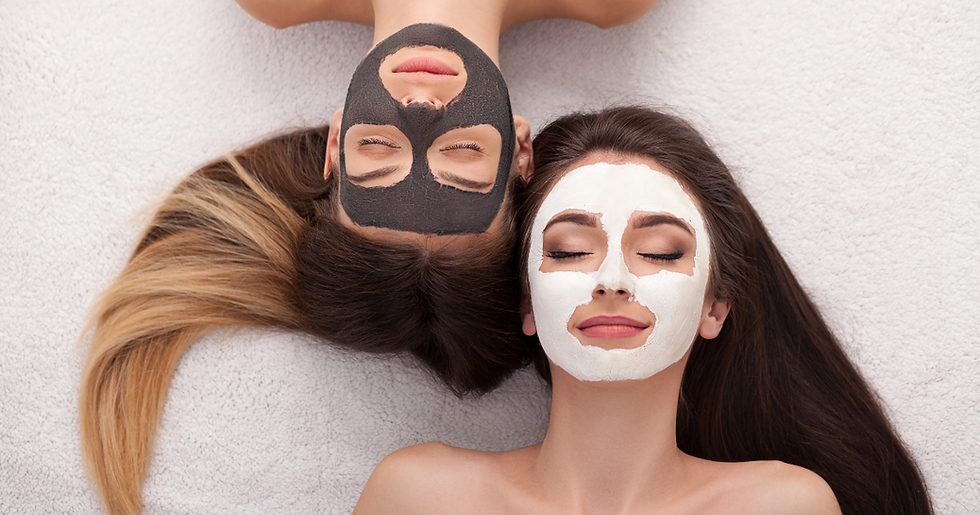The Hidden Impact of Client Energy: Protecting Your Mental Health as a Beauty Professional
- Sophia Sarantakos

- Jan 22
- 4 min read
Updated: Jan 25
Why Mental Health Matters in the Beauty Industry
The beauty industry is often portrayed as glamorous, creative, and fulfilling. While that’s true, what often goes unnoticed is the emotional labour beauty professionals invest daily. Whether you’re an esthetician, hair stylist, lash artist, or spa owner, you’re more than just a provider of beauty services—you’re a confidant, a problem solver, and sometimes even a therapist for your clients. This constant exchange of emotional energy can lead to emotional fatigue, burnout, and even physical symptoms if left unchecked.
We delve into the hidden mental toll of client interactions and offers strategies for beauty professionals to protect their mental health while thriving in their careers.
The Energy Dynamics of Client Interactions
Why Client Energy Impacts You
Every client brings their energy into the treatment room, salon, or spa. Whether they’re stressed, anxious, or overly critical, their emotional state can affect your mood and energy. As a beauty professional, you’re trained to remain positive and composed, but over time, absorbing or managing this energy can leave you feeling drained.
The Hidden Costs of Emotional Labour
The emotional labour beauty professionals perform goes beyond technical skills. You’re expected to:
Listen empathetically to clients’ personal stories.
Meet high emotional and aesthetic expectations.
Offer reassurance when clients are dissatisfied.
This consistent demand can lead to “compassion fatigue,” where you find it harder to empathize or connect with clients, leading to burnout or reduced job satisfaction.
Signs That Client Energy is Taking a Toll on You
Understanding the signs of emotional overload is critical to addressing the issue. Here are some common indicators:
Emotional Exhaustion: Feeling consistently drained or overwhelmed after work.
Physical Symptoms: Headaches, tension, fatigue, or sleep disturbances.
Irritability or Short Temper: Losing patience more easily, both at work and in personal life.
Dread Before Appointments: Feeling anxious or reluctant about seeing certain clients.
Disconnection from Work: Losing passion for your craft or doubting your career choice.
How to Protect Your Mental Health as a Beauty Professional
The good news is that you can safeguard your mental well-being while maintaining excellent client relationships. Here’s how:
1. Set and Communicate Clear Boundaries
Boundaries are essential for maintaining emotional balance and professionalism.
Professional Boundaries:
Clearly define your role during appointments. You are a beauty professional, not a therapist. While empathy is key, avoid diving too deeply into clients’ personal problems.
Time Boundaries:
Stick to your schedule. If a client consistently arrives late, remind them of your policies to avoid added stress on your workflow.
Example: “I’d love to chat more about that, but let’s focus on making your skin glow today!”
2. Create Energy-Resetting Rituals
Simple rituals can help you release negative energy and recharge between appointments.
Breathing Techniques: Spend two minutes practicing deep breathing to centre yourself.
Aromatherapy: Use a calming essential oil, like lavender or eucalyptus, after each appointment.
Symbolic Clearing: Wash your hands or spritz the room with an energy-clearing spray to mentally reset.
Example Ritual: After every client, take a 3-minute break to stretch, breathe, and focus on something positive before moving on to the next appointment.
3. Prioritize Self-Care Outside of Work
To give your best to clients, you must first care for yourself.
Physical Wellness: Eat balanced meals, stay hydrated, and get enough sleep.
Emotional Wellness: Journaling, therapy, or meditation can help you process emotions and maintain mental clarity.
Social Wellness: Spend time with supportive friends and family who uplift your energy.
Example: Dedicate one evening a week to an activity that brings you joy, like reading, painting, or walking in nature.
4. Learn to Manage Difficult Clients
Not every client will bring positive energy into your workspace, but you can control how you respond.
Stay Calm and Professional: Avoid taking negativity personally.
Redirect Conversations: If a client’s complaints are becoming emotionally taxing, steer the discussion toward solutions or lighter topics.
Let Go of Toxic Clients: If a client repeatedly drains your energy or disrespects your boundaries, it’s okay to part ways professionally.
Example Script: “I think another professional may be a better fit for your needs.”
Building a Mental Health-Friendly Workspace
1. Curate a Positive Environment
Your workspace plays a significant role in your mental health.
Add calming elements like soft lighting, relaxing music, and natural scents.
Personalize your space with plants, inspirational quotes, or calming artwork.
Create a staff area where you can unwind and recharge.
2. Limit Overbooking
While it’s tempting to maximize your schedule, overbooking can lead to burnout. Build buffer time between appointments to recharge and reset.
3. Offer Yourself Grace
Mistakes happen, and not every client interaction will be perfect. Avoid self-criticism and focus on what you’ve done well.
Why Mental Health Matters for Your Business
Protecting your mental health doesn’t just benefit you—it directly impacts your business.
Improved Client Relationships: A healthy, balanced professional can provide a better client experience.
Enhanced Creativity: When your energy isn’t depleted, you’re more likely to innovate and stay passionate about your craft.
Sustainable Career Growth: By prioritizing self-care, you’ll reduce burnout and increase your career longevity.
Your Well-Being is Your Superpower
The beauty industry thrives on creativity, passion, and connection, but these qualities can only shine when you protect your mental health. By setting boundaries, practicing self-care, and fostering a positive work environment, you can maintain your emotional well-being while excelling in your career.
Remember, taking care of yourself isn’t selfish—it’s essential. When your energy is balanced, you’ll not only enjoy your work more but also inspire positivity and loyalty in your clients.





Comentarios